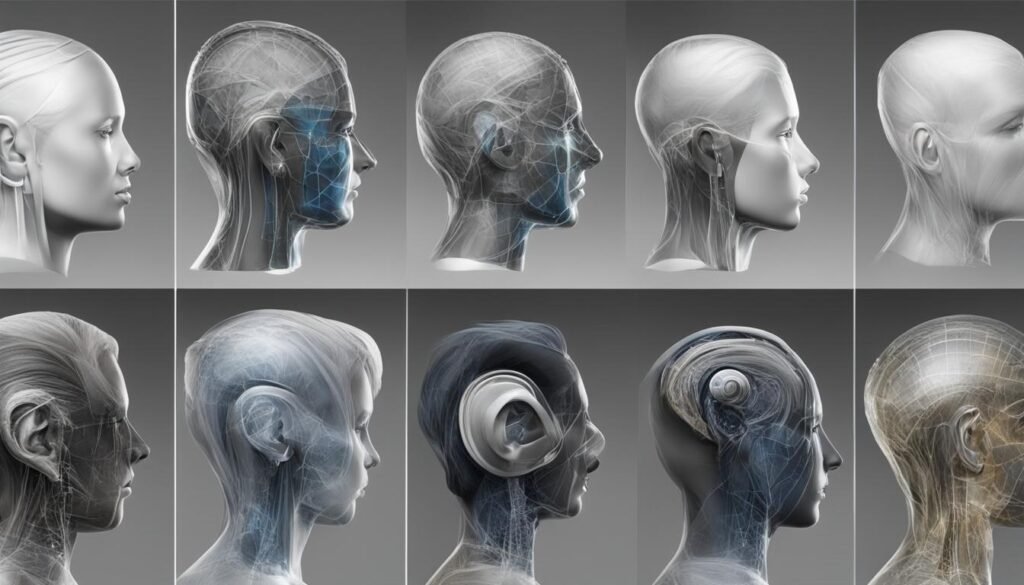Hearing loss can vary in severity, with different levels of impairment requiring different forms of treatment. Understanding the appropriate level of hearing loss for which a hearing aid is necessary can greatly impact an individual’s quality of life and communication abilities. In this article, we will explore the different levels of hearing loss and when a hearing aid may be recommended.

Key Takeaways:
- Hearing loss can be categorized into mild, moderate, severe, and profound levels based on the decibel range.
- A hearing aid is typically recommended for individuals with hearing loss within the 26-70 dB range.
- Severe or profound hearing loss may require alternative interventions such as middle ear implants or cochlear implants.
- Audiologists conduct hearing tests to assess the degree of hearing loss and determine the necessity for a hearing aid.
- Recognizing the signs of hearing loss and seeking early intervention can lead to better outcomes.
Understanding Hearing Loss Levels and Treatment Options
Hearing loss can vary in severity, from mild to profound. Each level of hearing loss requires a different approach to treatment. Here are the various levels of hearing loss and the corresponding treatment options:
Mild Hearing Loss:
You may not always require a hearing aid if you have mild hearing loss, which falls within the 26-40 decibel range. However, it is important to monitor your hearing and get regular check-ups to ensure that your hearing loss does not worsen over time.
Moderate to Severe Hearing Loss:
You likely have moderate to severe hearing loss if your hearing falls within the 41-70 decibel range. In this case, a hearing aid is often recommended to help improve your ability to hear and communicate effectively. Hearing aids amplify sounds and make them clearer, allowing you better to understand speech and other important sounds in your environment.
Severe to Profound Hearing Loss:
For individuals with severe to profound hearing loss, which falls within the 71+ decibel range, hearing aids may not be sufficient to restore hearing. Surgical interventions such as middle ear implants or cochlear implants may be recommended in these cases. These devices bypass the damaged parts of the ear and directly stimulate the auditory nerves, providing a more direct pathway for sound to reach the brain.
Understanding your level of hearing loss is crucial in determining the most appropriate treatment option. Suppose you suspect you or a loved one may be experiencing hearing loss. In that case, it is important to seek the guidance of a hearing healthcare professional who can assess your hearing and recommend the most suitable treatment for your needs.
Assessing the Degree of Hearing Loss
Hearing loss is classified based on the degree of severity, which is determined through a comprehensive hearing test conducted by an audiologist. This test measures the sounds you can hear on an audiogram, with normal hearing falling within the decibel range of 0 to 25 dB. Depending on the specific decibel range, hearing loss is categorized as mild, moderate, severe, or profound.
A hearing aid may be considered for improved hearing if your hearing falls within the mild to moderate range. The criteria for hearing aid eligibility are typically based on the degree of hearing loss and an assessment of how hearing difficulties impact your daily life. It’s important to consult an audiologist who can evaluate your hearing needs and recommend the most suitable treatment options.
Dive into the details of how to treat hearing loss due to allergies.
While mild hearing loss may not always require a hearing aid, it’s crucial to understand that even slight hearing difficulties can affect your overall quality of life. Untreated hearing loss can lead to communication challenges, social isolation, and reduced cognitive function. Therefore, if you suspect any hearing loss, it is recommended to schedule a hearing test to assess your hearing health and determine the appropriate treatment plan.
Criteria for Hearing Aid Eligibility:
- Audiogram results indicate mild to moderate hearing loss.
- Demonstrated the impact of hearing difficulties on daily life and communication.
- Consultation with an audiologist to assess individual hearing needs.
- Consideration of personal preferences and lifestyle factors.
Remember, seeking timely intervention and utilizing appropriate treatment options, such as hearing aids, can significantly improve your ability to hear and communicate effectively, enhancing your overall well-being.
Signs and Symptoms of Hearing Loss
Hearing loss can manifest through various signs and symptoms, which may indicate the need for a hearing aid. Recognizing these signs can help individuals seek timely intervention and improve their overall quality of life. Some common signs of hearing loss in adults include:
- Difficulty understanding conversations: Struggling to hear and comprehend what others say, especially in noisy environments.
- Frequently asking others to repeat themselves: Constantly needing others to repeat their words or phrases.
- Constantly turning up the volume: Increasing the volume on electronic devices, such as the television or radio, to hear better.
- Ringing or buzzing noises in the ears (tinnitus): Experiencing a persistent ringing or buzzing sensation in one or both ears.
In children, signs of hearing loss may present differently and can include:
- Lack of response to commands: Not reacting or responding appropriately when given instructions.
- Difficulty in understanding and responding to questions: Struggling to understand and answer questions asked by others.
- Increased volume needed to get their attention: Requiring louder sounds or voices to capture their attention.
If you or someone you know experiences any of these signs, scheduling a hearing test with an audiologist is crucial. Identifying hearing loss early on can help determine if a hearing aid is necessary and ensure proper intervention for improved communication and well-being.
Degrees of Hearing Loss and Communication Challenges
Understanding the severity of hearing loss is crucial in determining the appropriate strategies for communication. The degrees of hearing loss range from slight to profound, each presenting unique challenges. Slight hearing loss, which falls within the 16-25 dB range, may not require a hearing aid but can still impact an individual’s ability to hear certain sounds clearly.
For individuals with mild to moderate hearing loss, which falls within the 26-70 dB range, hearing aids are often recommended to amplify sounds and improve overall communication. However, as the severity of hearing loss increases to severe and profound levels (71+ dB), hearing aids alone may not address the communication challenges.

Communication challenges intensify with the severity of hearing loss. Individuals with severe to profound hearing loss often rely heavily on visual cues, such as lip-reading and sign language, for effective communication. It is important to note that hearing aids can still benefit these cases by amplifying residual hearing and making lip-reading easier. Learning alternate communication strategies and using assistive devices, like captioned telephones, can enhance communication for individuals with severe to profound hearing loss.
Preventing Hearing Loss and Seeking Help
Hearing loss is a common condition that can significantly impact an individual’s quality of life. Fortunately, many cases of hearing loss can be prevented through simple measures. By taking proactive steps to protect your hearing, you can reduce the risk of developing hearing loss and maintain optimal auditory health.
One of the most effective ways to prevent hearing loss is to limit exposure to loud noises. Whether it’s attending concerts, using power tools, or listening to music through headphones, prolonged exposure to loud sounds can damage the delicate structures of the inner ear. It’s important to use ear protection, such as earplugs or noise-cancelling headphones, in noisy environments to safeguard hearing.
Read Also: Can syphilis cause hearing loss.
Pregnant individuals should also be aware that certain infections and medications can pose a risk to the developing fetus’s hearing. By practising good prenatal care and following healthcare provider recommendations, the chances of hearing loss due to these factors can be minimized.
“Prevention is always better than cure.” – Desiderius Erasmus
If you suspect that you or a loved one may have hearing loss, it is crucial to seek help as early as possible. Untreated hearing loss can have significant consequences, including communication difficulties, social isolation, and decreased cognitive function. By scheduling a hearing test with an experienced audiologist, you can determine the extent of your hearing loss and explore appropriate treatment options, such as hearing aids.
Remember, prevention and early intervention are key to maintaining optimal hearing health. By taking proactive steps to protect your hearing and seeking help at the first signs of hearing loss, you can improve your overall quality of life and continue to enjoy the sounds of the world around you.
Conclusion
Understanding the severity of hearing loss is crucial in determining the need for a hearing aid. For individuals with mild to moderate hearing loss, hearing aids can provide significant benefits by restoring sounds and improving overall communication. Taking action early and seeking help from an audiologist can positively impact your quality of life.
However, it’s important to note that severe to profound hearing loss may require additional interventions beyond hearing aids. In some cases, middle ear implants or cochlear implants may be necessary for improved hearing. It is best to consult an audiologist who can assess your needs and recommend the most suitable treatment options.
If you experience any signs or symptoms of hearing loss, such as difficulty understanding conversations or constantly asking others to repeat themselves, it is recommended to schedule a hearing test. Early detection and intervention can improve outcomes and ensure you receive the appropriate support and assistance for your hearing needs.
In conclusion, recognizing the severity of hearing loss and taking action when needed is essential. Solutions can enhance your hearing and improve communication, whether you have mild, moderate, severe, or profound hearing loss. Don’t hesitate to contact an audiologist who can guide you through the process and help you regain the joys of hearing.
Frequently Asked Questions
What level of hearing loss requires a hearing aid?
Hearing loss within the 26-70 dB range, categorized as mild to moderate, may benefit from a hearing aid.
What are the treatment options for different levels of hearing loss?
Mild to moderate hearing loss is often managed with hearing aids, while severe to profound hearing loss may require middle ear implants or cochlear implants.
How is the degree of hearing loss assessed?
The degree of hearing loss is determined through a hearing test conducted by an audiologist, which measures the sounds you can hear on an audiogram.
What are the signs and symptoms of hearing loss?
Signs of hearing loss in adults may include difficulty understanding conversations, constantly increasing volume and experiencing ringing or buzzing noises in the ears. In children, signs may include a lack of response to commands and difficulty understanding and responding to questions.
What communication challenges are associated with different degrees of hearing loss?
Communication challenges increase with the severity of hearing loss, with individuals with severe to profound hearing loss relying heavily on visual cues and lip-reading for effective communication.
Can hearing loss be prevented, and when should I seek help?
Many cases of hearing loss can be prevented through public health interventions. Seeking help if you suspect hearing loss is recommended, as early intervention can lead to better outcomes.
When is a hearing aid necessary?
A hearing aid may be necessary when hearing loss falls within the mild to moderate range and hampers daily activities and communication.



